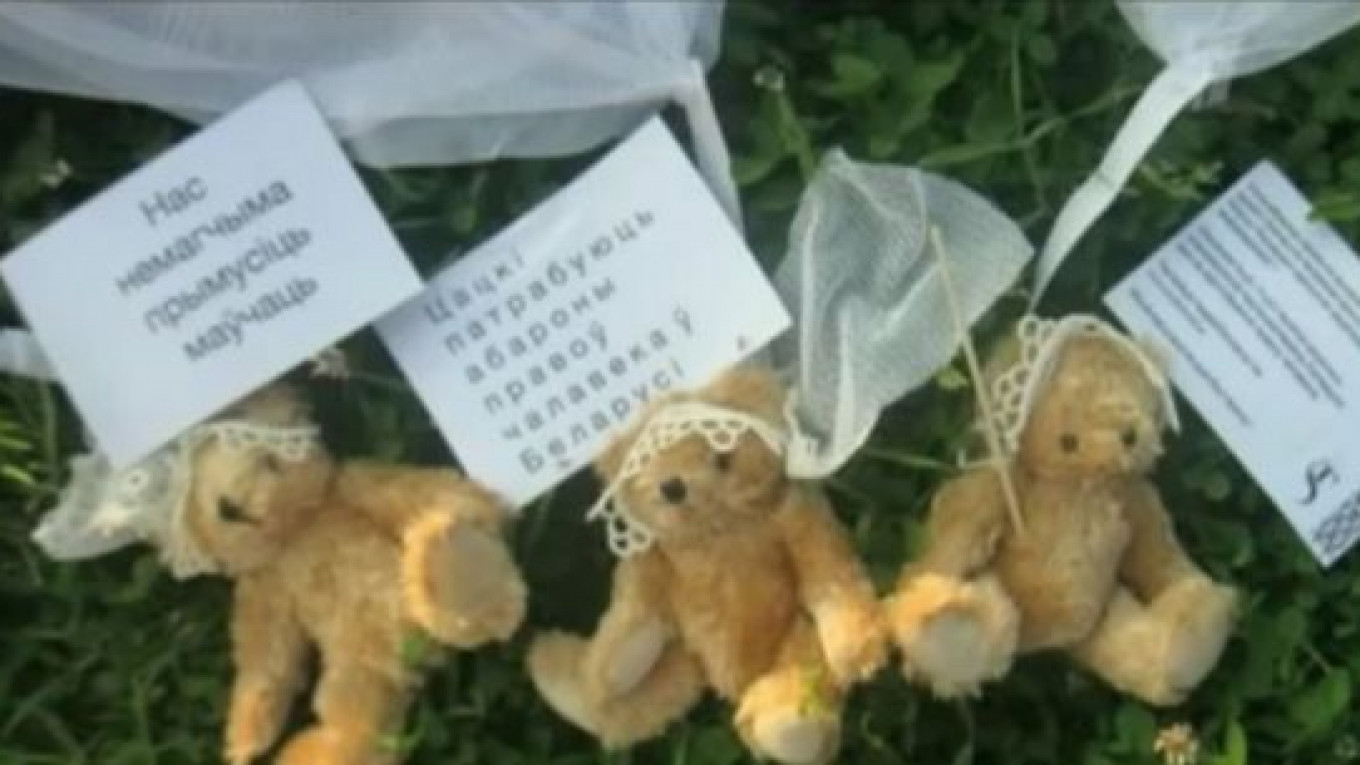MINSK — It's probably the first time in history that teddy bears have defeated generals.
President Alexander Lukashenko has sacked two of Belarus’ top defense officials after two Swedish advertising agency employees piloted a light plane into the country's heavily guarded airspace, dropping 879 teddy bears decked out in parachutes and slogans supporting human rights.
Belarussian officials denied the July 4 incident until Lukashenko called a meeting last week to scold authorities for allowing such a "provocation."
Lukashenko on Tuesday fired the nation's air defense chief and the head of the border guards service and reprimanded several other top security officials, his office said Wednesday.
Thomas Mazetti and Hannah Frey, the two Swedes behind the stunt, said they wanted to show support for Belarussian human rights activists and embarrass the country's military, a pillar of Lukashenko's power.
"Hopefully, we've made people more aware in the world and there will be more people supporting Belarussian people," Frey said.
The Swedes' year-long preparations involved learning how to pilot the three-seater Jodel aircraft and purchasing the plane. They financed the 150,000 euro ($184,500) cost of the stunt with their work in a small advertising agency.
The pair said they were inspired by similar protests staged by Belarussian activists, who have at times arranged plush toys in such a way that they appeared to be protesting the regime.
"Our campaign was a campaign in support of that. An airlift in support of the teddy bears, from teddy bears around the world," Mazetti said.
The flight began and ended at the Pociunai airfield in southern Lithuania. Thunderstorms that day may have made it harder for Belarus to scramble aircraft to intercept their plane, said Mazetti, though he acknowledged that they risked being shot down.
"We flew an airplane at 50 meters, that's 150 feet, for 1 ? hours inside Belarus. Of course we were aware of the risks. But it was a calculated risk and we thought we needed to take that risk ourselves — we couldn't hire anyone," he said in an interview in Berlin, where the two are currently staying. "But we will not do it again tomorrow, if I put it that way."
Authorities in Belarus have also arrested a journalism student who posted teddy bear photos on his personal website and a real estate agent who offered an apartment to the Swedes. The two men were accused of assisting border violators and face up to seven years in prison if convicted.
Lukashenko has boasted about the capabilities of a joint air defense system that Belarus has formed with Russia, saying it provides a reliable shield against purported threats from NATO.
Valery Karbalevich, an independent Minsk-based political analyst, said purging the generals might be a way to save face in front of Moscow. The Kremlin may use the incident to try to put a Russian general in charge of the joint air defense system, he said.
"It looks like Moscow is cranking up pressure and demanding an answer as to why the much-acclaimed air defense system is riddled with holes," Karbalevich said.
Anatoly Lebedko, the head of Belarus' opposition United Civil Party, warned that Lukashenko may use the incident to crack down on dissidents in the run-up to a parliamentary election next month.
In May 1987, another amateur pilot, Matthias Rust from Germany, made a similarly dashing flight into closely guarded Soviet airspace, landing his light Cessna plane next to the Kremlin. Soviet leader Mikhail Gorbachev responded by firing the defense minister and many other representatives of the top military brass.
Channel One ran pictures of the teddy bears touching down near the town of Ivyanets in early July.
A Message from The Moscow Times:
Dear readers,
We are facing unprecedented challenges. Russia's Prosecutor General's Office has designated The Moscow Times as an "undesirable" organization, criminalizing our work and putting our staff at risk of prosecution. This follows our earlier unjust labeling as a "foreign agent."
These actions are direct attempts to silence independent journalism in Russia. The authorities claim our work "discredits the decisions of the Russian leadership." We see things differently: we strive to provide accurate, unbiased reporting on Russia.
We, the journalists of The Moscow Times, refuse to be silenced. But to continue our work, we need your help.
Your support, no matter how small, makes a world of difference. If you can, please support us monthly starting from just $2. It's quick to set up, and every contribution makes a significant impact.
By supporting The Moscow Times, you're defending open, independent journalism in the face of repression. Thank you for standing with us.
Remind me later.






